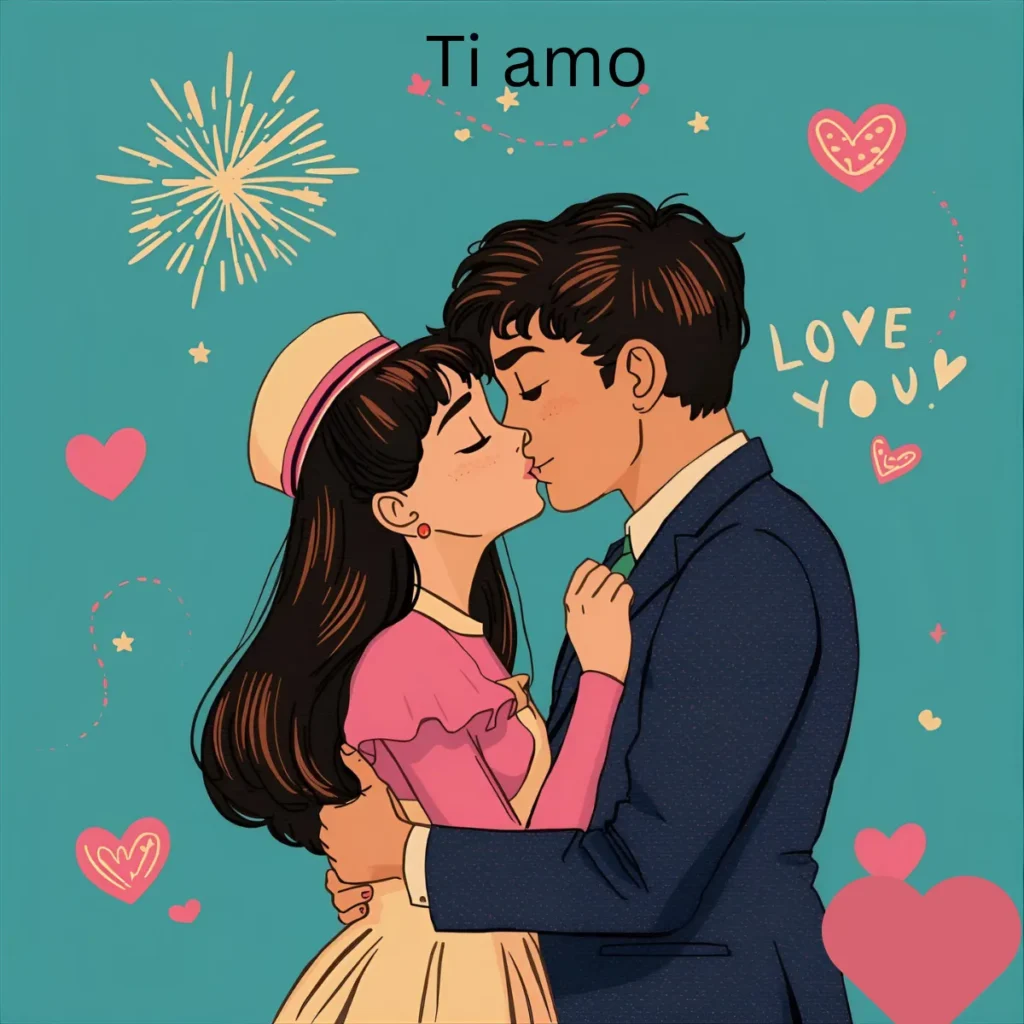How to Say I Love You in Italian is something every learner wants to know, especially when expressing deep emotions. The most common phrase is “Ti amo”, which is used in romantic relationships.
Another common variation is “Ti voglio bene”, often said to friends and family to express affection and care. Learning these expressions helps you connect more personally in Italian and share your feelings with warmth and sincerity.
Say I Love You in Italian
Let’s explore 15 ways to say I love you in Italian, complete with conversation examples and the cultural or historical background of each.
15 Phrases to Say I Love You in Italian
| # | Italian Phrase | English Meaning |
|---|---|---|
| 1 | Ti amo | I love you (romantic) |
| 2 | Ti voglio bene | I love you / I care for you (friends, family) |
| 3 | Ti adoro | I adore you |
| 4 | Sei il mio amore | You are my love |
| 5 | Sei la mia vita | You are my life |
| 6 | Sei il mio tutto | You are my everything |
| 7 | Ti penso sempre | I always think of you |
| 8 | Ho bisogno di te | I need you |
| 9 | Mi manchi | I miss you |
| 10 | Sei speciale per me | You are special to me |
| 11 | Sei il mio cuore | You are my heart |
| 12 | Sei la mia anima gemella | You are my soulmate |
| 13 | Non posso vivere senza di te | I can’t live without you |
| 14 | Sei il mio sogno | You are my dream |
| 15 | Ti amerò per sempre | I will love you forever |
1. Ti amo – I love you (romantic)

Origin & Use:
Used in romantic relationships. “Ti amo” is reserved for deep, romantic love, like between partners or spouses. Saying this too soon in a relationship in Italy can come off as intense.
Example:
👤 User A: Ti amo, Laura. Sei tutto per me.
👤 User B: Anch’io ti amo, Marco. ❤️
2. Ti voglio bene – I care about you / I love you (non-romantic or early romantic)
Origin & Use:
Literally “I want good for you.” It expresses deep affection but not necessarily romantic love. Used between close friends, family, and sometimes in early stages of dating.
Example:
👤 User A: Buonanotte, mamma. Ti voglio bene.
👤 User B: Anch’io, amore mio. Dormi bene.
3. Mi piaci – I like you (romantic interest)

Origin & Use:
Literally “You please me.” A common way to show romantic interest in the early stages of a relationship.
Example:
👤 User A: Sai una cosa? Mi piaci tanto.
👤 User B: Anche tu mi piaci!
4. Sei il mio amore – You are my love
Origin & Use:
A poetic and tender phrase used between lovers. Often heard in songs or love letters.
Example:
👤 User A: Buongiorno, amore mio. Sei il mio amore.
👤 User B: E tu sei il mio!
5. Ti adoro – I adore you
Origin & Use:
Borrowed from Latin adorare. Used to express admiration and affection—either romantically or playfully.
Example:
👤 User A: Sei così dolce… ti adoro!
👤 User B: Ma dai! Che carino sei!
6. Sei la mia vita – You are my life

Origin & Use:
Romantic and dramatic, as only Italians can be. Common in poetic contexts or emotional declarations.
Example:
👤 User A: Non riesco a stare senza di te. Sei la mia vita.
👤 User B: E tu sei la mia!
7. Sono innamorato/a di te – I’m in love with you
Origin & Use:
Used when someone wants to be clear that they are not just interested—they’re deeply in love.
Example:
👤 User A: Devo dirtelo… sono innamorato di te.
👤 User B: Lo sapevo. Anche io lo sono.
8. Ti amo con tutto il cuore – I love you with all my heart

Origin & Use:
Classic phrase found in Italian poems and songs. Emphasizes depth of emotion.
Example:
👤 User A: Non è solo amore… ti amo con tutto il cuore.
👤 User B: Mi fai piangere… anch’io.
9. Ti tengo nel cuore – I keep you in my heart
Origin & Use:
More poetic and sentimental. Often used in long-distance or nostalgic contexts.
Example:
👤 User A: Anche se siamo lontani, ti tengo nel cuore.
👤 User B: Lo sento… ogni giorno.
10. Amore mio – My love
Origin & Use:
Literally “my love.” Used as a term of endearment in daily life, phone calls, texts.
Example:
👤 User A: Ciao, amore mio! Come stai?
👤 User B: Bene, e tu amore?
11. Cuore mio – My heart
Origin & Use:
More poetic than “amore mio,” often heard in romantic dramas and older films.
Example:
👤 User A: Cuore mio, quanto mi sei mancato.
👤 User B: Anche tu mi sei mancato tanto.
12. Mi manchi – I miss you
Origin & Use:
While not directly “I love you,” it’s deeply emotional and implies love. The phrase translates as “You are missing from me.”
Example:
👤 User A: Mi manchi ogni giorno.
👤 User B: Anche tu. Tantissimo.
13. Ti penso sempre – I always think of you
Origin & Use:
A subtle yet romantic way to show deep affection. Common in texts, letters, or songs.
Example:
👤 User A: Anche se non ci sentiamo tanto… ti penso sempre.
👤 User B: Questo significa tanto per me.
14. Ti stringo forte – I hold you tight
Origin & Use:
Often said at the end of a conversation, it conveys longing and emotional closeness.
Example:
👤 User A: Non posso essere lì adesso, ma ti stringo forte.
👤 User B: Lo sento… grazie, amore.
15. Ti amerò per sempre – I will love you forever
Origin & Use:
A timeless romantic phrase found in wedding vows and love songs.
Example:
👤 User A: Ti amerò per sempre, qualunque cosa accada.
👤 User B: E io amerò te, per sempre.
FAQs
1. What is the most common way to say “I love you” in Italian?
The most common phrase is “Ti amo.”
2. When should I use “Ti amo”?
Use “Ti amo” for romantic love — boyfriend, girlfriend, husband, wife.
3. Is there a different phrase for friends or family?
Yes, you use “Ti voglio bene” for friends and family — it means deep caring love.
4. How do you pronounce “Ti amo”?
Say it like: tee AH-mo.
5. How do you pronounce “Ti voglio bene”?
Say it like: tee VOH-lyo BEH-neh.
6. Can I text “I love you” casually in Italian?
Yes! You can text “<3 Ti amo” or “TVB” (short for Ti voglio bene).
7. What’s a cute or flirty way to say it?
You can say “Sei il mio cuore” (You are my heart).
8. How do I say “I love you so much”?
Say “Ti amo tanto” or “Ti voglio bene tanto.”
9. How do I say “I love you forever” in Italian?
Say “Ti amerò per sempre.”
10. Can I use these phrases in Italy without sounding weird?
Yes — Italians are expressive and affectionate, so saying it sounds natural and warm.
Conclusion:
How to Say I Love You in Italian is best expressed with “Ti amo” for romantic love and “Ti voglio bene” for family and friends. These phrases carry deep cultural meaning and allow you to share love in authentic Italian ways. By learning different variations, you can express affection more naturally in every type of relationship.

Liam Bennett is a dedicated content writer who creates clear, engaging, and well-structured articles.
He focuses on delivering practical information that is easy for readers to understand and apply.
Liam Bennett currently writes high-quality content for repliesnest.com, ensuring clarity and reliability.



